Your motorhome will have two batteries – a starter battery in the engine and a leisure battery to provide power to the 12-volt appliances in your leisure vehicle.
In this video, we visit RoadPro and talk to their resident motorhome battery expert, Andy Harris, about the different types of batteries in a motorhome. Plus, he has some top tips for choosing, understanding and looking after your motorhome’s batteries.
What are the different types of battery in a motorhome?
Leisure batteries operate very differently to the similar-looking battery that is used to start your motorhome’s engine, which needs to supply power in an instant burst.
A starter battery is used to start your motorhome engine and will power the radio and probably any hard wired alarm or tracking device you have fitted.
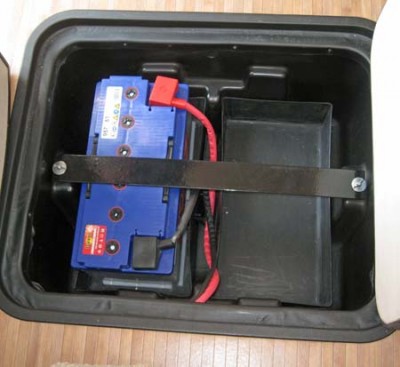
A motorhome leisure battery provides power to all the systems in the habitation area, such as the lighting, water pump, 12V sockets etc. Deep-cycle leisure batteries provide their power over long periods, so the cycle of discharging/charging is longer, too.
A typical leisure battery is the lead-acid type and, as such, will self-discharge, to a greater or lesser extent depending on make, age etc. You need to be able to keep an eye on electrolyte levels, and top up as necessary.
When a motorhome leisure battery is discharged, it will start to deteriorate. So, it should always be kept warm, comfortable and well-fed…with electricity.
Other leisure battery types include AGM (for Absorbent Glass Mat, a form of matting between the plates that filters the sulphuric acid inside a battery, making it more resilient in use) or Gel – a format that means no free-flowing liquid and less gassing.
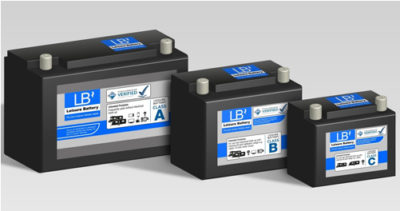
More recently, lithium batteries have come to the fore. Ideally suited to owners who use their vehicles “off-grid” (i.e. away from campsites and other sources of mains charging), these don’t self-discharge, are truly maintenance-free, and work particularly well in conjunction with an inverter.
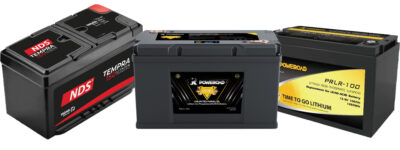
The capacity of a leisure battery is measured in amp hours (Ah) – that’s the amount of power that is stored in the battery. Any quoted figure will be at an ambient temperature of 25degC. As a guide, for every one degree below this, the battery’s Ah capacity will fall by one percent.
The most common leisure battery capacity is around 100 Ah but they do go up to 200Ah and more, depending on how much power you need.
What kind of leisure battery do I need?
It depends on the type of touring you’re going to be doing in your motorhome. If you rely almost solely on mains hook-up whilst you’re touring, you don’t actually need a top-quality leisure battery.
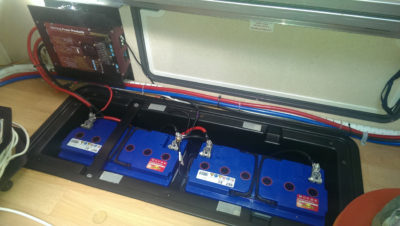
If you’re going to be off-grid a lot in your motorhome and have a lot of appliances that use a lot of energy, such as a drop-down bed or levelling system then you’re going to have to take that into consideration when choosing your leisure battery and the capacity that you’ll need.
Make sure any new battery you buy will fit in the dedicated space your existing battery or batteries live.
Do I have to charge my motorhome leisure battery?
Yes, always keep your battery fully charged, even when not in use.
A leisure battery receives a charge when driving your motorhome, when hooked up and a campsite and if you have a solar panel fitted and the sun is out.
Get an intelligent charge
One consideration is to fit an intelligent charger. Such a fitting works effectively all year round, and make sure you get an efficient and safe charge to your leisure battery.
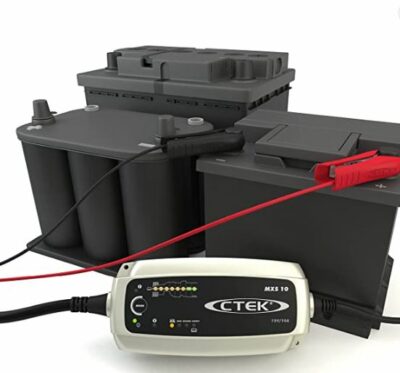
How do I check the charge in my motorhome battery?
Check the control panel in your motorhome – some will display the current voltage and others will have an LED display of red to green, where green is good and red is bad! If the voltage is shown in numerical form, 12.7v or more is considered fully charged. 12.4v is considered 50% charged and anything less than 12v is considered discharged.
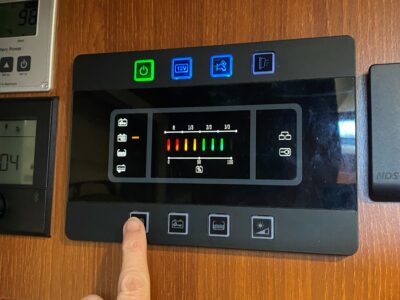
If you’re not sure about the condition of your motorhome battery take it to a specialist to have a look – and of course, your annual habitation check will check the condition of your battery and provide a health report.
What if a leisure battery is dead?
The first thing to do is to try to revive it using an intelligent smart charger as it will determine the best way of bringing it back to life. If it’s still not holding its charge it will need to be replaced.
How do I look after a motorhome battery in winter?
Winter can be a trying time for your motorhome’s leisure battery (or batteries).
Here’s how to cope…
If you’re planning a bit of a rest from your motorhome in winter and you want to go back to a healthy leisure battery, it’s time to start looking after it. Right now!
One of the key factors is making sure your battery doesn’t get too cold, because that’s when performance really can deteriorate. Location can be key – most professionally converted motorhomes have in-board locations for their leisure batteries, where it’s hardest for the extremes of cold to get at them – it’s those with external access battery boxes than can be most vulnerable.
That’s just one reason why the best advice for anyone not using their motorhome in the winter is to disconnect the leisure battery and store it somewhere dry indoors (note, also, it’s a myth that you shouldn’t keep a leisure battery on a concrete floor – there is nothing to prove such a location speeds up the rate of discharge). Then connecting it to an intelligent, mains battery charger, as mentioned above, will help to keep your battery healthy.
Through winter, you can keep your leisure battery connected and, because intelligent chargers are constantly monitoring, it means there’s no chance of over-charging. For many, this is the ideal scenario. Key names to look for include Automate, CTEK, NDS and Sterling.
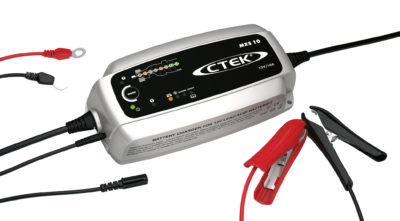
Only do this however, if removing the battery doesn’t affect the performance of any essential electronics such as tracking devices or alarm systems. That depends if these devices power from the leisure battery or not. If the devices are powered by the starter battery then keep an eye on the voltage by checking your motorhome’s control panel, starting the engine or your tracking device or alarm might have an app which alerts you when the battery levels are low.
Motorhome leisure battery top tips
- Make sure your motorhome batteries are wired and installed in the correct manner
- Charge your battery after purchase and before each use
- Check the electrical status of your motorhome leisure battery regularly and don’t let it go into the red zone
- Keep an eye on the physical condition of the battery. If it’s a wet lead acid battery keep it topped up with distilled water. Check the base and tray to make sure there’s no liquid in there, and if there are any bulges or cracks replace the battery immediately
- Keep the terminals and posts free from corrosion. Lightly coat them with petroleum jelly to prevent them from sulphating
- If you can, always use an intelligent battery charger to keep your motorhome’s leisure battery fully charged, even when not in use. They will extend the life of your battery and the way that it works
- Always keep the battery upright, firmly secured, and vented to the outside
- Make sure any new batteries will fit in the available space in your motorhome and that it has sufficient amp-hour capacity to power the devices you use in your motorhome
- If you’re laying up your vehicle for the winter, charge the battery at the end of the season and remove it from the motorhome, or use a permanently connected intelligent charger
- Check your motorhome for appliances that draw a constant charge from the leisure battery, e.g. a tracking system that may be connected to your leisure battery in some cases, as you will need to counter this draw with a constant recharge to maintain the battery and you won’t be able to remove your leisure battery
- If at any time you can smell rotten eggs around your battery then get rid of it as this suggests it is damaged or seriously degraded
- Take your motorhome for an annual service as this will include a check of the status and condition of your batteries.
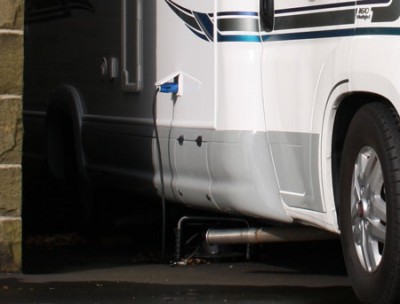
Motorhome battery don’ts
- Never over-charge your battery and leave it permanently connected to a hook-up. Once disconnected from the charger and, after 24 hours, a fully charged 12V battery should have a voltage of 12.7V or more. This can be checked on your motorhome’s display panel or with a multimeter
- Never over-discharge your battery. A battery is fully discharged when the load voltage is 11.70V – this means charge immediately!
- Never leave your battery in a discharged state for a prolonged period of time
- Never reverse the polarity on your battery charging leads as this may damage the battery and charger
- Never rely on an automotive alternator only – it may reduce battery life. Worth knowing, also, is these days some base vehicles have “smart” alternators, which may not fully charge a leisure battery.
Motorhome leisure battery top tips summary
- As long as your motorhome has access to daylight through the winter, a solar panel can keep your leisure battery charged. Beware of over-charging, however, particularly if your panel has a cheap regulator. Also keep your solar panel clean for optimum performance
- Overcharging can be just as bad for your leisure battery as undercharging
- As a general rule, never allow your leisure battery to discharge below 50 percent of its capacity
- Battery performance will deteriorate with age. A typical leisure battery can last as little as five years. Winter is often the time when you find out how good your leisure battery actually is
- Ideally, use a leisure battery charger rather than a standard vehicle unit
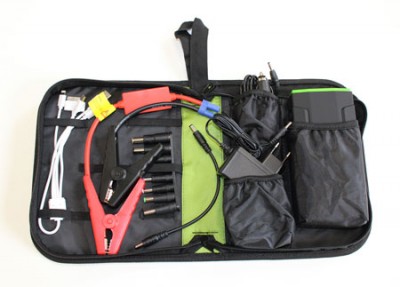
Get the right motorhome leisure battery
In response to concerns that too many suppliers were suggesting their batteries were suitable for leisure vehicle use, trade body the National Caravan Council introduced a Verified Leisure Battery Scheme.
It categorises leisure batteries as: A, for frequent use away from a mains charging source (e.g. camping off grid without a mains hook-up); B, for frequent users, who also have access to mains hook-ups; or C, lower-capacity batteries whose main use is for short periods.

You can find out more here: http://www.thencc.org.uk/our_schemes/ncc_verified_leisure_battery_scheme.aspx.
Also, the following download lists batteries it deems acceptable: http://www.thencc.org.uk/downloads/Verified_Battery_Register_October_2017.pdf
Key motorhome battery contacts
Regular servicing of the habitational aspects of your motorhome will include assessments of the leisure battery (or batteries, if you have more than one).
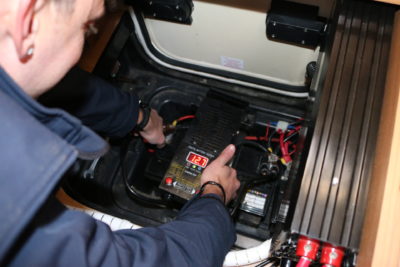
Independent suppliers who can recommend which leisure batteries and related accessories are best for you include:
RoadPro www.roadpro.co.uk
Manbat www.manbat.co.uk
Tayna Batteries www.tayna.co.uk
Over to you…
Got any advice on looking after your motorhome’s leisure battery to pass on to others? Feel free to add your comments below.


I’ve had three Motorhomes all from new, had the first just over 2 years, second 7 years, and current one 11 years. All had separate cab/ICE (engine) and habitation batteries of the lead acid type, charged via a split charger. I’ve traveled extensively around the UK, but not abroad, all sites used had electric hook-up. When at home my Motorhomes connected to home supply. Home supply to them provided via a switch timer, during summer they were supplied for 5 hrs 3 days a week, and from November to March the timer’s override switch used, as I’ve always put an electric fan heater in the habitation area set via a digital thermostat to control the temperature within 0.5 of a degree C, and set to 7 degrees C to stop damp and mildew, which to-date I’ve avoided, also batteries don’t like freezing conditions. With the first two Motorhomes none required their batteries renewed. My current one now 11 years old, at 10 years the habitation battery started loosing charge, this year 2025 the cab/ICE (engine) battery wouldn’t start engine, so replaced. I’m told 10 years is about as good as you can expect from these batteries. My car owned from new at 10 years old last year also had to have it’s battery replaced. I’ll just add I don’t think leaving a Motorhome static for 3 to 4 months over winter period will do the Motorhome or any good, mine are taken for a maintenance run at around every 4 weeks, besides getting the engine up to running temperature it also stops damage to wheel bearings and flat spots on tyres. Also when Motorhome is left static, with mechanical security devices fitted, I leave handbrake off as otherwise this can lead to brakes pads sticking to discs and drums
Although I have a Lithium leisure battery, I am considering changing to AGM. From what I have seen the biggest risk with Lithium is fire, often caused by heat. Once they do ignite, there is little or nothing that can be done and the ferocity of the burning has to be seen to be believed. Unless there is a very quick release for the battery, easily accessible from the outside, there is little to no chance that you would be able to save the van.
Just purchased an Elddis 135 with solar panels and split controller (Truma) for connecting to leisure and engine battery.
Elddis will not connect charger or solar supply to engine battery, as Peugeot will not permit permanent connections between engine battery and habitation unit. Will invalidate the warranty!
Engine battery supplies tracker and alarm, so battery discharges within 2 weeks.
Motorhome parked off grid in secure storage when not in use.
Am ‘stuck’ with taking motorhome for a drive every 2 weeks to charge the engine battery or taking home for mains charging (CTEK).
Unnecessary restriction (my view) by Peugeot and not what I expected.
Hi and very good pointers.As I have a split charger fitted I just wire my CTEK charger to the starter battery and run about 4 hours a day.This then charges LB after the starter batt. Bit worried tho as thought leisure battery best indoors and kept warm!
Make sure your solar panel is set up for the correct type of battery. Mine was not, it lead to the battery power reading being too low and took quite some time to find the cause.
Great advice Richard.
My campervan has a 350w solar panel on the roof run through a MPPT controller. It has 3x 130ah batteries which are also charged via the 40amp VSR. Whenever I plug the camper into the EHU I have hardwired into the van a 10A automatic multi-stage mains battery charger. The other thing that I have installed is a Nasa battery BM1 monitor and 200amp stunt as the unit continuously monitors voltage, current (charge or discharge), number of amp/hours (charge or discharge), the batteries state of charge and the time to charge or discharge.
I check the voltage on both my batteries regularly and keep them charged using the onboard charger in the charge controller. I can’t use my solar panel in winter as the vehicle is kept under cover!
I have found that if I switch the motorhome supply to the vehicle battery on the charge controller and then switch on the charger in the charge controller it then charges the vehicle battery. Am I ok doing this?
We have recently suffered a fire in our motorhome apparently started by one of the leisure batteries – has anyone else had experience of this happening and were you able to identify a cause? We have a 2004 A-class Burstner with 2 115Ah batteries (Halfords 3 years old) charged via the original equipment EBL charger. The fire started while the vehicle was being driven, so charging from the alternator and no hook-up connected. Many thanks.
Sorry to hear about this Mike.
I understand that the Varta LFD range and their Bosch equivalent are superior to standard lead acid and AGM batteries both for leisure and starting,
Can you confirm this? Thanks.
A leisure battery and a starter battery have to perform different functions and therefore operate in different ways.
We don’t believe there’s a battery that is good for both starting an engine and running appliances.
Hi what great help and advice you have answered many of my questions regarding my motor home batteries . I like others intend to put an extra solar panel onto my auto trail as soon as I get a mild day .
Thanks Andrew. Glad you found our advice helpful.
Useful. Our two leisure batteries are be in replaced today along with the 12v fridge for a 3 way.
Trust this ends our lack of evening power for lights, Tv etc.
Since I started using a solar panel 4 motorhomes (and 20 years) ago I have never experienced a flat battery. The first one I purchased was a 50W panel that I fitted to the roof of the RV and simply wired it to a 2-way switch, the outputs being connected to the engine battery and the house batteries. Due to the low power of the solar panel, and the reduced presence of strong sunlight in the UK, it didn’t need a charge controller.
Our next RV already had a 120W solar panel fitted to the roof and wired to the house batteries via a Fox solar charge controller. I fitted a Battery-master and this provided excess charge to the engine batteries. Our subsequent RV had a 180W solar panel installed at point of purchase with a US version of the Battery-master and was regulated via a proprietary solar charge controller. When we replaced that RV with our current one I fitted two 100W solar panels to the roof regulated by a top-end MPPT solar charge controller. The vehicle came equipped with a Battery-master.
As I said I have never experienced a flat battery scenario in twenty years. I totally believe in solar panels as we spend a lot of time “dry” camping in fields at Steam rallies and Vintage Transport shows. Also, I do check the electrolyte levels regularly and top up with de-ionised water as necessary.
Thanks Neal – that’s really helpful.
I too had a problem Yuasa battery on my Elddis Accordo 125 and had to change it, Halfords had an offer on their leisure battery. I lay my motorhome up for 6 months of the winter and installed a flexible 100w solar panel which I stuck flat to the roof. It keeps the leisure battery topped up and I run a lead from the charge controller to the engine battery in the passenger footwell to keep the electronics and tracker working.
I USE A LED VOLTAGE METER IN EITHER OF THE CIGARETTE LIGHTERS IN MY MOTOROME
IT TELLS ME VOLTAGE ON LEISURE BATTERY OR VOLTAGE ON THE CRANKING BATTERY COST £5 <
MY LEISURE BATTERY IS UNDER PASSENGER SEAT SO I HAVE A SET OF TORX BITS AND A 1/2 INCH TO 1/4 INCH DRIVE COST £20 < TO REMOVE SEAT FOR ACCESS
THIS WAS LESS THAN QUOTE FOR DEALER TO PERFORM TASK!
Great little bit on batteries for motorhomesale, many thanks.
Thanks Ralph.
I had many problems with the Yuasa battery and charging system on my new Elddis Accordo 125. On one occasion the battery overheated and bubbled when connected to the mains and the internal charger unit failed. I took advice and went for a superior Banner battery which has been fine but the vendor of this advised that a battery needs to be used even during the winter when the van is laid up and so I do this from time to time.
When the van is not in use I use Ctek smart chargers for the leisure battery when I disconnect it from the van’s system and also use one on the engine battery which I simply plug into the permanently connected wired which an AA man kindly installed and which tucks under the seat when not in use. He said it was vital to trickle charge the Peugeot battery when laid up.
Thanks for sharing Barry.
Good article. I usually declare SORN on my camper from Nov to March to save some road tax and have the van on timed power connection for 4 hours a day from my garage socket. The van is parked in my driveway. It is enough to keep the leisure battery fully charged and is ready and healthy for the new season of camping.
Hi I am new to the joys of motor homes – if I leave my vehicle hooked up to mains electricity for the winter will this help the leisure battery?
Hi Wayne, it will help charge the battery. A typical motorhome set up is designed to prevent overcharging.
By good article on leisure batteries
Thanks for the positive feedback Martin.